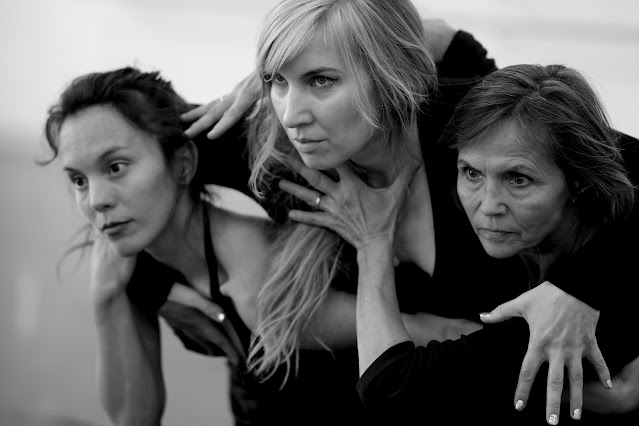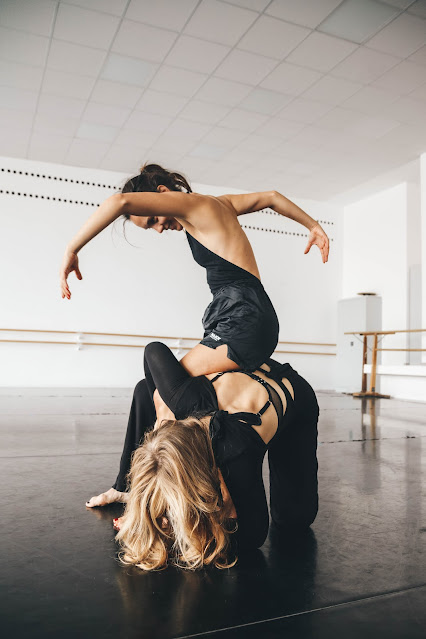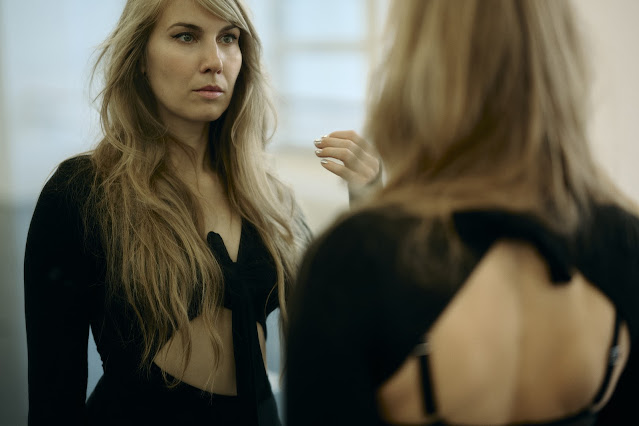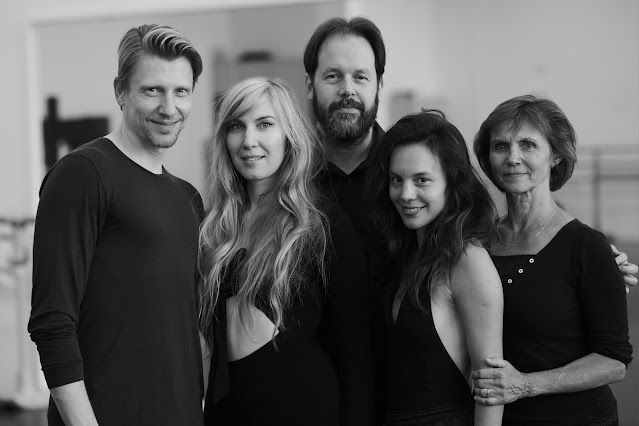 |
| Baba Yaga workshop -Ana Dordevic, Rowan Hellier, Carola Schwab – (Photo: Pascal Buenning/Deutsche Oper) |
Rowan Hellier is a mezzo-soprano who, along with her operatic career, is known for creating projects which blur the boundaries of genre, discipline and aesthetic, often centring on women’s stories and her concepts have featured at major venues such as Wigmore Hall. At the Oxford International Song Festival in October, Rowan is presenting her latest project, Baba Yaga: Songs & Dances of Death. This production combines music, dance, spoken word, and a specially commissioned song cycle by Elena Langer.
 |
| Baba Yaga workshop (Photo: Tina Dubrovsky) |
For the evening, Rowan will be joined by pianist Sholto Kynoch, dancers Ana Dordevic and Carola Schwab and will be collaborating with choreographer Andreas Heise, whose version of Winterreise with Juliane Banse was a highlight of the 2023 Oxford International Song Festival. Baba Yaga is a co-production between Beethovenfest Bonn and Oxford International Song Festival, and the new cycle by Elena Langer is an Oxford International Song Festival production.
The idea for the show originated when Rowan was reading the writings of Mexican-American writer and Jungian psychoanalyst Clarissa Pinkola Estés, best known for her book Women Who Run with the Wolves (1992). Rowan was interested in Estés’ ideas about the wildness and wisdom inherent in women and how these relate to archetypes like Baba Yaga. She was fascinated by the ambiguities which Baba Yaga embodies; a figure from Slavic folklore, you don’t know whether she is good or bad. In some tales, she helps people and in others she hinders. She can be seen as an ogress, a snake, a death figure, the shadow self or a matriarchal ancestress. All of which link to the idea of witches.
Rowan is interested in reclaiming the idea of the witch as an alternative to society’s script for older women. In a culture obsessed with youth, this feels like a radical act, she says. The figures of real witches were originally medicine women and healers in the community, yet they were then turned upon and persecuted.
For music, Rowan has turned to folk music, Slavic, Scottish, Lithuanian, so that alongside Mussorgsky’s Songs and Dances of Death there will be music by Tcherepnin, Dvorak, Janacek, Jake Heggie and Tori Amos, plus Elena Langer’s new commission.
Rowan’s interest in interdisciplinary performance, taking part in cross-disciplinary residencies, research, and her own experience on stage led her to the idea of introducing dance and choreography. She feels that bringing different disciplines together could be potentially potent and fertile, especially in the song recital medium – a space where great subtlety and intimacy co-exist with virtuosity and drama. So, she wants to combine virtuosity of the body and the voice, to push things and see how far they can go, feeling that the process will be fascinating for performers and the audience. She has never used dancers before in a show, and for this project she will be moving also, integrating song and movement. This is something new for her, but she has been involved in a Ring Cycle that was choreographed and she has produced pieces that include dance. Baba Yaga embodies the three in one of womanhood: maiden, mother, crone – shown in the three women figures on stage. Rowan wants to question this patriarchal, reductive view of a woman’s lifecycle and seek to offer alternative reimaginings to it with this Baba concept.
For Rowan, Russian-born British composer Elena Langer is great at building characters in sound and Rowan mentions the shimmering sounds that Langer creates. “With Elena’s piece, I wanted to create a counterpart to the glorious Mussorgsky Songs and Dances cycle, which is full of death, destruction and the horrors of war, but also vivid dance rhythms and life! In Mussorgsky’s Songs and Dances of Death, the Death-skeleton woman strides across the battlefield in the final song, telling the dead and the dying that she will dance on their bones at a future midnight banquet so they may never rise again. In the compellingly ambiguous figure of Baba Yaga—she who guards the fountains of the water of life in a forest hut that spins continuously on bird’s legs—I see a more nuanced take on, or alternative to Mussorgsky’s female death figure.“
With Langer’s Slavic heritage (she was born in Moscow), she knew about Baba Yaga and was very interested in the project. Also, Rowan feels that Langer applies wit and a dark sense of humour to her work so that there is a playful element to her pieces. For the new piece, she is setting, amongst others, women poets of the Soviet Era, which brings an added thread of protest and resistance to the mix. Rowan has a long-time song duo partnership with Sholto Kynoch (artistic director and founder of the Oxford International Song Festival) and the two were students together at the Guildhall School of Music and Drama. They discussed the musical choices together, including the selection of Elena Langer as composer.
Rowan hopes that they are able to take the programme elsewhere as exploring Baba Yaga is a concept that should fit in various contexts, whilst the interdisciplinary approach and varied musical programme with jazz and pop influences mixed with the classical will appeal to a wide range of audience ages and interests.
This Summer, Rowan is performing in Verdi’s La Traviata in open-air performances being given by Staatstheater Braunschweig; there are 16 performances in all. Also, Rowan has been jogging and taking dance classes in order to train to be able to sing and ‘jump around’ for 75 minutes in Baba Yaga. She admits that it is a challenge, but then she loves a challenge and always finds herself pleasantly surprised at what we are capable of when we push ourselves. What the body can do when you put your mind to it. And she has found this with her voice, relishing the challenges of singing Giovanna Seymour in Donizetti’s Anna Bolena which opened her eyes to what her voice is capable of.
She is also interested in what you learn about yourself physically and mentally through these challenges; dance requires attention to anatomy, as does singing, but differently, combining these is part of the challenge and fascination!
 |
| Rowan Hellier (Photo: Pascal Buenning/Deutsche Oper) |
The Baba Yaga project fits into the overarching theme centring on women’s stories that are common to Rowan’s previous projects. She is interested in expanding the operatic and song canon either by commissioning new work or building new projects to create more nuanced female characters. She is keen to offer an alternative to the Madonna-Whore Dichotomy prevalent in so much of the operatic canon in women’s roles. To give audiences more nuanced, realistic characters for women but also to create such repertoire for future singers.
Her programme She Represents was inspired by 1920s-30s art of the ‘New Objectivity’ movement in Germany (the title of a 1928 watercolour by Jeanne Mammen). The result is a costumed lieder recital exploring female expression and definition of self, inspired by artworks by Mammen and Otto Dix depicting real women, with music by Rita Strohl, Kurt Weill, Cathy Berberian and others. The recital evokes a specific period in the development of the ‘New Woman’, a feminist ideal and icon of changing gender norms, for whom dress, behaviour and sexual liberation played an important role in bringing about changes in societal attitudes towards women. Rowan premiered the show at the Oxford International Song Festival 2023, opened Glasgow Cathedral Festival 2024, and there are plans for future performances.
The programme Wom3n arose after discussions between three thirty-something women – poet Hollie McNish, composer Kate Whitley and Rowan. This resulted in the song cycle Gorgeous Beasts which formed the centrepiece of a programme inspired by female friendship in all its humour and forthrightness, alongside music by Judith Weir and Olga Neuwirth. Wom3n was notably performed by pianist Sholto Kynoch and Rowan at Wigmore Hall on International Women’s Day 2022, and Gorgeous Beasts subsequently for an Association of Women in the Arts event at No. 11 Downing Street.
 |
| Baba Yaga workshop – Andreas Heise, Rowan Hellier, Sholto Kynoch, Ana Dordevic, Carola Schwab (Photo: Pascal Buenning/Deutsche Oper) |
Baba Yaga: Songs & Dances of Death – Rowan Hellier, Sholto Kynoch, Ana Dordevic, Carola Schwab & Andreas Heise – 22 October 2025, Oxford International Song Festival. Further details.
The blog is free, but I’d be delighted if you were to show your appreciation by buying me a coffee.
Elsewhere on this blog
- The Merry Widow meets the Godfather: Scottish Opera brings John Savournin’s production of Lehár’s operetta to Opera Holland Park – review
- Enjoyment, exploration & sheer virtuosic fun: Sisters from Karine Deshayes & Delphine Haidan – record review
- The earth moves: Antoine Brumel’s 12-part Earthquake Mass & Tallis’ 40-part motet from Peter Phillips & The Tallis Scholars – concert review
- Lieder, songs and sonnets: David Butt Philip in Vaughan Williams, Alma Mahler, Wagner & Britten at Wigmore Hall – concert review
- A Visit to Friends: The opening work of the Aldeburgh Festival’s 76th edition fell to Colin Matthews’ first foray into opera – opera review
- A sonic portrait of British Jewish families: composer Na’ama Zisser on the JMI Archive – interview
- The one where Dido kills Aeneas: Oliver Platt radically refocuses Purcell’s opera at Guildhall School – opera review
- Redefining “Success” as a Classical Musician – guest posting
- From kazoo & harpsichord to electronically-augmented ensemble: Alex Paxton’s Delicious is a multi-layered maximalist delight – cd review
- A window onto the sound world of the Tudor Court on progress: Henry VIII on Tour from Ensemble Pro Victoria & Toby Ward – cd review
- Home










